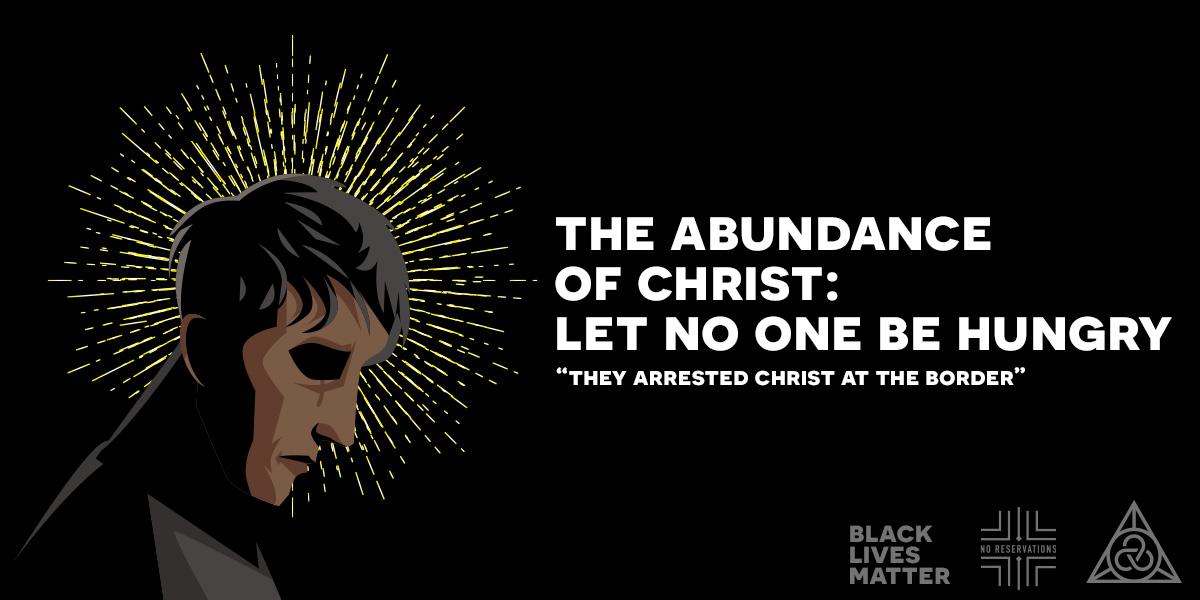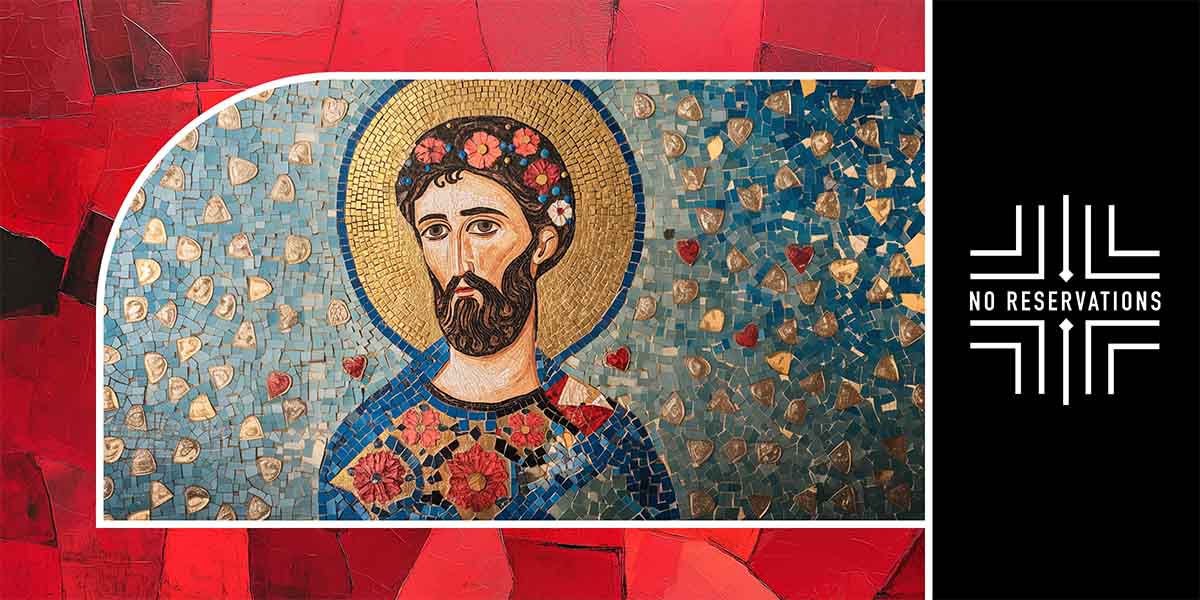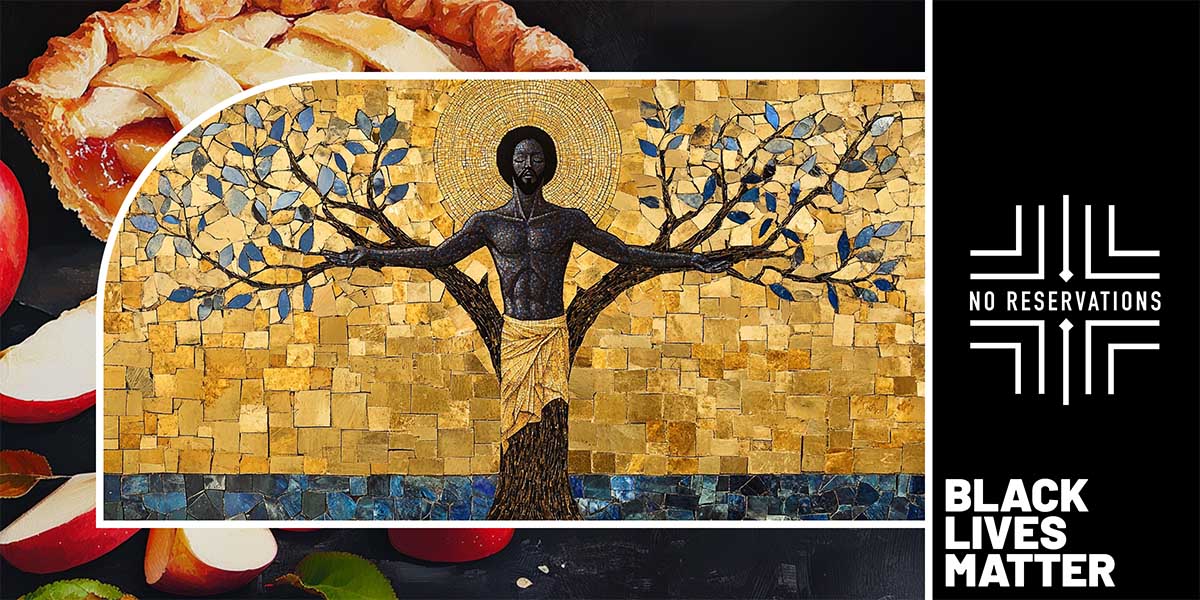And once we do that, once we become the walking embodiments of Christ in the 21st century, everything that we do will reflect that reality.
Matthew 14: 15-20 Collective Edition (CE)
15 Around dinner time, the followers of Jesus looked at the multitude around them and said, “It is getting late, and there is nothing around here for these people to eat. Let us send them back into the nearby towns for them to buy something to eat.” 16 Jesus looked at the crowd and was moved by compassion and said: “They do not need to go back to the towns, what did we pack to eat on this journey?” 17 They replied. “We only have our shares of bread and fish.” And Jesus said, “Take baskets and go around the crowd and tell them to fill the baskets with all that they brought to eat, no matter how small it may be, and bring them to me so I may bless them.” 18 After the crowds all shared what they had into the baskets, Jesus took the abundance of food and said, 19 “This cornucopia of sustenance represent the collective will of each one of you and your willingness to share in your abundance with others, let us bless this food, for in your compassion it has become Holy, come now and eat for all is ready.” 20 All of those gathered ate out of the abundance of food available, for all had shared, and all were filled, leaving baskets full of food untouched by those who no longer hunger.
Church Potlucks
One of my favorite aspects of the church – or at least the church prior to the era of the Coronavirus – is the potluck. I have a real soft spot for a classic church potluck. A potluck is one of those elements that link the institution of the church to almost 2000 years of history. The entire concept of sharing meals is as ancient as Christianity itself. It’s evident in the commemoration of the Last Supper, a ritual that many church communities today celebrate monthly. However, before communion was reduced to a simple meal of wine and bread, the early church celebrated community through grand feasts that served as a lifeline for those impoverished and marginalized by Roman imperial society.
This is why potlucks hold a special place in my heart and faith. Potlucks perfectly illustrate faith in action, as a few share their abundance to feed many. I intentionally used the term “few,” as everyone knows that in every American church, despite multiple invitations, weekly bulletin announcements, mass email campaigns, and multiple in-service announcements, there are always the few faithful who invariably show up with two or three dishes ready to share and serve.
Here’s to all of you with that secret mac and cheese recipe, the mere taste of which makes you question its legality, given the growing addiction potential with every bite. Or those famous fried chicken strips from your secret family recipe book – even though you nearly got spotted at Publix that morning buying your “secret family chicken recipe” from the deli counter. Potlucks are a way for us to come together, share our abundance, and celebrate the quirks that make us individuals within a community. Potlucks provide a glimpse into our past, our family, and our willingness to bring food to share with others without expecting anything in return.
On any given potluck Sunday, my favorite thing to do is sample a bit of everything – even the dishes that might look questionable to the untrained eye. I trust that the love invested in these dishes will guide me through. Surprisingly often, the dish that I initially found most dubious turns out to be the one that everyone in the room would give anything to replicate.
What Does the Bible Say?
Our scripture reading today presents what could arguably be considered the first potluck in Jesus’s ministry. And as we read today, it appears that little has changed in the last 2000 years when it comes to organizing a potluck. Let’s take a moment and use our sacred imagination to understand what was unfolding.
Jesus, tired and hungry from traversing the lesser-known areas of Judea, was accompanied by a group of people who had become followers of his liberating message. These individuals had nothing to lose in following Jesus; they were the ones ostracized by the ruling class of Judea and crushed by the oppressive economic realities of the Roman Empire – a reality that saw the few control the lands and the products derived from those lands. Consequently, the people following Jesus were already at the end of their collective rope.
Yet, Jesus’s ministry resonated deeply with many of them, touching the core of their divinity.
They followed the One whose compassion, as we learned last week, led Jesus to establish a ministry that challenged every aspect of the society into which he was born, lived, and was ultimately executed by. People followed a message of hope that did not hinge on the promise of liberation from a God or gods descending from heaven to eradicate the world’s evils. Instead, it arose from an awakening of a new humanity, one that discarded the world’s evils and was restored by the promise of love and hope for all.
This promise was swiftly adopted by those who followed Jesus as they collectively recognized that salvation would not descend from above, but would spring from within. They were inspired to view the world, their lives, and their circumstances through a new set of ideals. Ideals that encompassed compassion for all and sought to eradicate the toxic systems of the imperial world through the sharing of abundance and community.
In our sacred reading today, we witness the beginnings of the church’s mission. Jesus, operating in his Christ identity, instructed the disciples to gather food and share it with everyone present. However, the disciples’ initial reaction was to operate within the old mentality, unable to envisage a way of being in community with one another, a way that would leverage the human trait of sharing. Consequently, they failed to comprehend the Christ mentality that if everyone shared what they had, an abundance of supply would be guaranteed.
I can anticipate what many of you might be thinking or saying at this moment. It was a miracle; there’s no need to justify or even attempt to explain how nearly 10,000 people were fed. And yes, I did say 10,000. This is because most Bible translations specify that the 5,000 counted were only the men, excluding their partners or children who would have accompanied them.
So yes, we could leave the story there and declare it a miracle: food began to self-replicate without the use of any technology. But to accept the story merely as a miracle from above binds us, the readers, to the same antiquated systems where the status quo is preserved by our inability, as Christ’s people, to envision a world where such stories can become reality. Not because food rained down from heaven like manna, but because the “Mind of Christ” sparked something within us. Something that urges us to share and relish the joy that comes from sharing with others.
That is the belief I choose to embrace today. Believe that through the awakening of Christ within us, we can dissent from the voices in our heads saying: “We don’t have enough food to share, let them go home,” or, “Not everyone has contributed or can contribute, so let’s share only with those who have and not with those who don’t.”
Looking at the story, the disciples had enough food among them to share. For they, like anyone embarking on a long journey through a desert, would have brought food to eat, given that the nearest Little Caesars, with their five-dollar pizza deals, was still a staggering 2000 years away. This is where the Christ Ideal becomes activated. Christ finds an innovative solution to the problem at hand. Jesus instructs his disciples to collect all the food that the crowd is willing to share and bring it over for his blessing. Jesus knew that his message of Hope and Love would inspire those around him to share, uniting them as One Collective Will. So the people shared all they had, and they ate and were satisfied. For many, they came to realize that survival is not a solitary endeavor; when others join in, survival becomes a communal activity, and that community fosters life through abundance.
The Dissenting Ways of the Early Church
Paul was also cognizant of this abundance. The early Christian communities that emerged across the Roman Empire were places where people from all walks of life convened to share a common meal and establish a sense of community with one another. Since the church was primarily nestled within people’s homes, it represented the Kingdom of God by welcoming all to a shared table and distributing the bounty brought to that table. This abundance likely mirrored the economic realities of the time, with those possessing more contributing more and those with less offering only what they could.
This, my friends, marked the genesis of the church— an institution that, regardless of how conservative voices might portray it, evolved into a dissenting voice against a power structure aiming to manipulate the many through the will of the few. In stark contrast to that dominance, the church fostered a beloved community comprising all members of Roman society across all walks and expressions of life. This community embraced the ideals of unity, asserting that their survival wasn’t bound to toxic power systems but to a communal lifestyle that shared power and wealth with all. It was a gathering of individuals who accepted each other’s limitations, pain, hurt, and trauma, aiming to bring about collective healing by embracing one another. They saw each other not through societal labels but through the unifying power that pledges us all as a new creation in Christ. Therefore, it was imperative to embrace one another as such. Paul made this message crystal clear when he declared that in Christ, nothing separates us, for the labels we have fabricated to divide one another have been obliterated by the One who chose to sacrifice their life on a cross out of love so that others might awaken to this new life within themselves.
Abundance is Life
This leaves us with an intriguing truth: for many churches today, the ministry they’re called to fulfill has been distilled down to potlucks and meaningful moments of community. There is nothing wrong with that; many of us are weary, overworked, and live day to day merely attempting to survive. In our struggle to survive, we have lost sight of our dissenting mission and of one another. This is how the flawed systems of humanity retain power, keeping the masses in a state of survival, barely making ends meet in a society that continues to inflate the cost of basic human needs. So, in merely trying to survive, we become too busy, too stressed, and too consumed by our own survival to realize that many of us are in the same exact predicament.
Now, I’m not discussing politics here, although there’s plenty of blame to go around on all sides of that constructed political aisle. Instead, I’m discussing transforming the place we call “church” into the epicenter of what the Kingdom of God could look like as a tangible place on Earth, and that transformation must begin with us.
Many of us look to places like Walt Disney World to sell us a vision, a dream of a better world, a place where dreams come true. However, the reality is that the best parts of that Disney dream exist in our capacity as a church, as the people of the Living Christ, to offer liberation to all who encounter us. This enables us to collectively envision our ideal life and our ideal world moving us beyond hypothetical scenarios. It grants us the power to embrace the potential of what we can achieve together once our collective wills are aligned towards the transformation of the toxic, ancient systems around us by first transforming ourselves into new creations in Christ.
Once we accomplish that, once we become the walking embodiments of Christ in the 21st century, everything we do will reflect that reality. Compassion will fill us, causing us to pause and embrace forgiveness and grace for the times we’ve been hurt by others and for the instances when we have inflicted pain on others as a symptom of our generational hurts and pains and of our own self-destructive loops. When compassion begins to radiate from our collective hearts, abundance will surely follow. As we become people who share everything we have with one another, we embrace a way of life that does not view the sharing of abundance with suspicion or encased in fear and political maneuvering. Instead, we operate like the faithful few at our potlucks, asking: what can I bring to make others happy? What can I create that is a reflection of who I am and my heritage? What can I purchase to ensure that all who come are content and satisfied? How can I share my abundance?
We all know that, at the end of the day, death makes us all equal. Therefore, let’s adopt the Christian perspective of death and defiantly stare it in the face by living our lives as Christ would want us to – in abundance and happiness with one another. Let’s share all we have and all we are with each other, loving one another without reservations or expectations of that love being reciprocated because we understand that it’s better to give than to receive.
The apostles could not conceive the possibilities of an abundant life. Today, right here in our hearts and minds, let’s embrace those possibilities. Let’s become walking examples of God’s Hope for all humanity as we seek to change the world not through the solutions presented by the antiquated, toxic systems of power but through the embrace of creative, dissenting solutions made possible by compassion and the sharing of our abundance. As we share from the abundance of our lives, all will be able to partake, moving humanity beyond living for survival and, instead, living for one another.
So, say we all, Amen.
By: Pastor Harold Marrero





